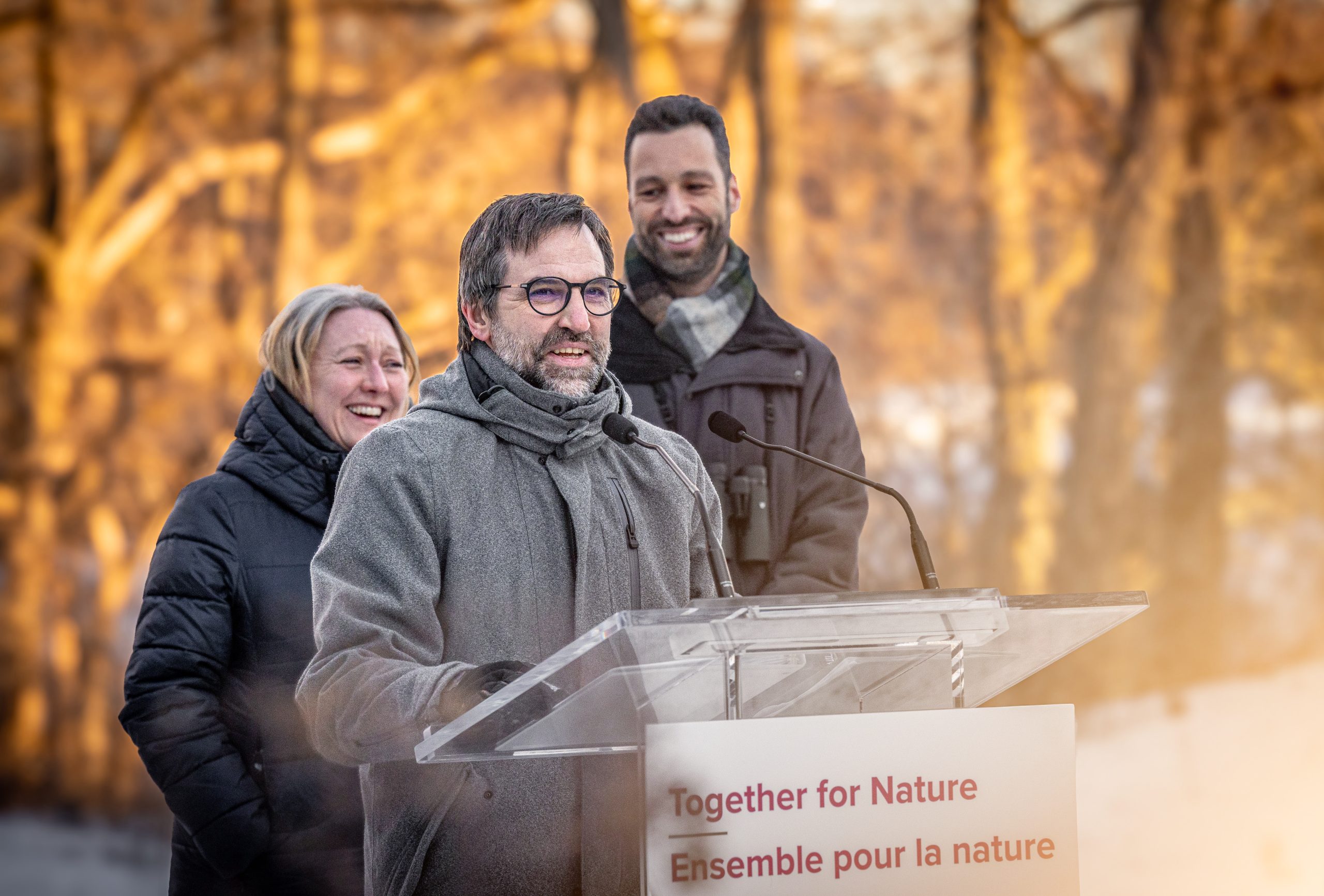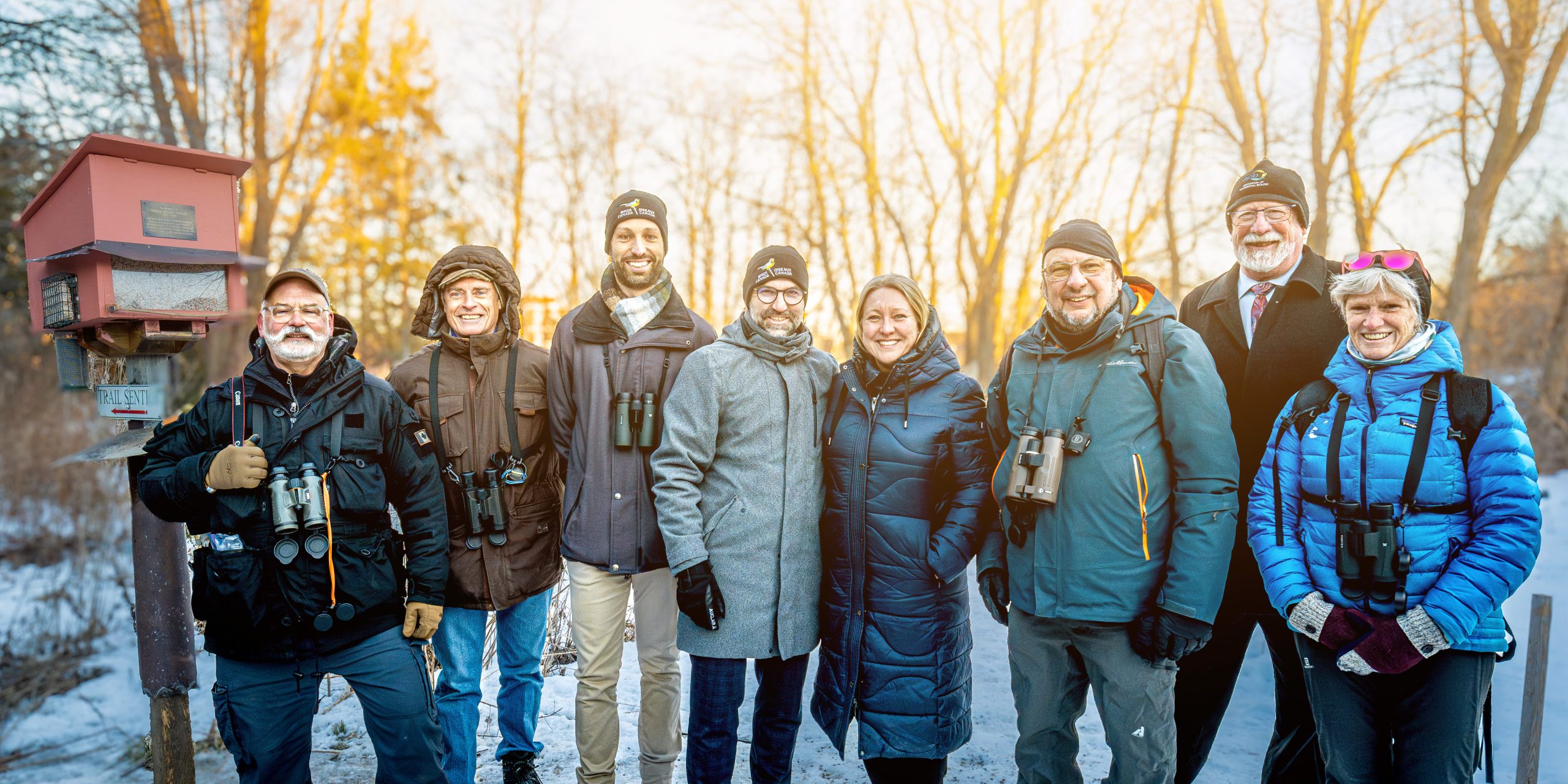By LeaAnne Ross, Senior Director, Communications and Community Engagement and Stephanie Brunet, Bilingual Communications Coordinator
Birds are the most accessible and effective indicators of the health of our ecosystems. These feathered ambassadors serve as more than just creatures of beauty, they are at the heart of Canada’s biodiversity and play an essential role in maintaining healthy, resilient ecosystems in our communities.
On February 14, the Honourable Steven Guilbeault, Minister of Environment and Climate Change, announced an investment of $3 million to Birds Canada. The funding will support Citizen Science programs and open data, providing access to over 200 million data records gathered by volunteers and professional biologists on the distribution, abundance, and population trends for birds in Canada.

Environment and Climate Change Canada (ECCC) announced an investment of $3 million to Birds Canada. From left to right: Mona Fortier, MP for Ottawa–Vanier, Honourable Steven Guilbeault, Minister of Environment and Climate Change, Patrick Nadeau, President and CEO of Birds Canada. Photo: Mark Lipman
Birds are undergoing a catastrophic decline. North America has lost 3 billion birds since 1970 – nearly ⅓ of our birds. The most effective conservation actions come from a sound understanding of which birds are declining, where, and why. In Canada, this understanding comes in large part from the work of Citizen Scientists. Our Citizen Science programs mobilize more than 74,000 volunteers, doing the equivalent work of nearly 2000 full-time professionals.

We would like to thank all Citizen Scientists, volunteers, and partner organizations who work hard all year to support this important work! From left to right: Aaron Hywarren and Christian Renault as Regional Coordinators for the Ontario Breeding Bird Atlas, Patrick Nadeau President and CEO of Birds Canada, Honourable Steven Guilbeault Minister of Environment and Climate Change, Mona Fortier MP for Ottawa–Vanier, Bernie Ladouceur for Christmas Bird Count, Dick Cannings MP for South Okanagan–West Kootenay, Emilia Michaud of Bird Friendly Ottawa. Photo: Mark Lipman
Birds Canada’s open data platform, called NatureCounts, currently stores over 200 million records, making it one of the largest biodiversity databases in the world. What do we do with all that data? Birds Canada staff collects, cleans up, analyses, and stores this data, then makes it freely available to everybody. Every year, thousands of scientists, government officials, academia and industry groups use their data to inform decision-making that can have a direct impact on wildlife and land protection. In 2021-22 for example, data from Birds Canada programs were used in 533 peer-reviewed publications. Citizen Science data also helped to identify Canada’s Key Biodiversity Areas, and to assess to what extent individual bird species are threatened.
This investment is directly aligned with the commitments Canada made under the Kunming–Montréal Global Biodiversity Framework, like Target 21, which aims to ensure that the best available biodiversity data, information, and knowledge are accessible to decision-makers, practitioners, and the public.

The birds were out in abundance despite the cold! House finches, Northern Cardinals, Black-capped Chickadees, White-breasted Nuthatches, Dark-eyed Juncos, and Downy Woodpeckers were all spotted. Photo: Aaron Hywarren
We couldn’t have chosen a better backdrop for this announcement at the Fletcher Wildlife Gardens, which is run by the Ottawa Field-Naturalists’ Club. The Fletcher Wildlife Garden is a long-term project of the Ottawa Field-Naturalists’ Club. It is accessible to naturalists, gardeners, schoolchildren, and other residents of the city and its suburbs and encompasses a variety of natural habitats.
We also wanted to say thank you to all Citizen Scientists across the country participating in programs like; Breeding Bird Atlases in Ontario and Newfoundland, the annual Christmas Bird Count, Project FeederWatch, and Great Backyard Bird Count.
To see the full announcement, watch here.
